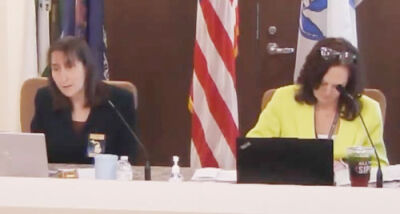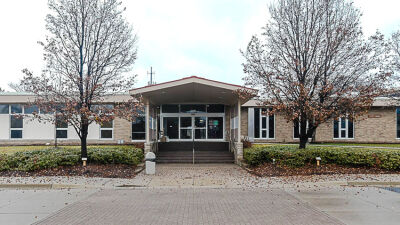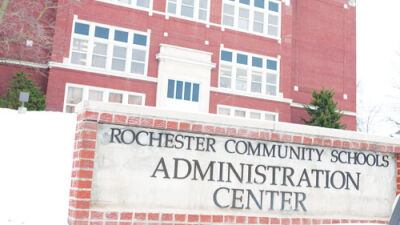
Madison Heights Mayor Roslyn Grafstein, left, and City Manager Melissa Marsh receive the budget proposal for the new fiscal year at the meeting May 12.
Screenshot image taken from Madison Heights City Council broadcast
MADISON HEIGHTS — The proposed budget for the new fiscal year has been adopted, without changes, by the Madison Heights City Council. While the overall operating millage will not increase, water and sewer rates will see an increase due to rising commodity costs.
“Everyone knows that the price of everything is going up, and for the city, our expenses are increasing but our revenues are not,” said Madison Heights Mayor Roslyn Grafstein.
Approval was unanimous at the meeting May 12.
The budget keeps the overall operating millage locked in at 25.4572 mills — the same as the current fiscal year. The city collects $1 for every $1,000 of a property’s taxable value, multiplied by the millage rate.
However, the water and sewer rate will increase 6.36%, due to costs passed on by both Oakland County and the Great Lakes Water Authority.
The new rate goes into effect July 1. Water rates will increase from $4.44 per unit to $4.74, while sewer rates will increase from $6.56 to $6.96.
Officials note that even with this increase, Madison Heights will still offer some of the lowest water and sewer rates in the tri-county area.
The overall budget weighs in at $66.1 million, of which $42.3 million is allocated for the general fund — a decrease of 9.2% from the current fiscal year’s amended budget.
This drop is the result of reduced capital spending, as well as the elimination of four vacant full-time positions.
Meanwhile, $8.8 million has been allocated to the capital improvement fund, which pays for a variety of road work, park improvements and water/sewer line replacements.
There is also $14.2 million programmed for the water and sewer fund, which covers rising costs for water and sewage treatment and other infrastructure needs.
The budget was balanced using more than $436,500 in general fund reserves. Reserves are expected to total $11.4 million by the end of the current fiscal year.
In addition, funding is available for another school resource officer, which will be jointly funded with the Lamphere Schools.
Funds are also available for IT infrastructure upgrades at the city’s administrative offices, including a firewall update and improvements to telecommunications.
In terms of projects, nearly $2 million is in place for major and local street repairs, including along John R Road, and $2.5 million is earmarked for water and sewer work.
The city is also investing in parks and recreation, including improvements at Rosie’s Park.
The budget features $15,000 to expand community programming, as well as $3,000 to continue the city’s food composting drop-off program. Another $15,000 is earmarked for the makerspace and other programs at the Madison Heights Public Library.
The budget also trims back the length of the annual recreation brochure and puts the savings towards a new quarterly citywide newsletter that will be included as a newspaper insert with the Madison-Park News.
The budget allocates $7.7 million for the police and fire pension fund, including $4 million in contributions beyond the required annual minimum. The goal is to raise the pension funding level above 60% by June 2026.
“More than a quarter of every dollar in taxes that are sent to the city are automatically tied up in promises that were made for pension and health care services delivered in years prior,” said Mark Bliss, the mayor pro tem. “So, when you give us a dollar in taxes, a quarter is already gone … and the (other) roughly 70 cents is then made available for us to make choices in the budget.”
The city has seen reduced revenues due to the decline of cable franchise fees from $500,000 to $350,000. Court revenues have been declining, as well.
Madison Heights, like all Michigan municipalities, continues to wrestle with the long-term effects of Proposal A and the Headlee Amendment, two state policies that together limit what a city can collect from its tax base to 5% or the rate of inflation, whichever is less.
Officials describe the system as an unfair tax structure for those purchasing a new home. Barring legislative changes at the state level, future budgets may have to adjust service offerings or incorporate targeted millage proposals to maintain current levels.
“It’s going to be a real challenge for us in the coming few years,” said Madison Heights City Councilman William Mier. “Almost every department did take a decrease this year, with some projects put on hold since we didn’t want to increase the rate.”
Bliss wanted to remind the public that the tax burden each resident faces is different due to the way assessed values are determined.
“The house next to you that was bought five years ago has a very different assessed tax rate than the house next to you bought 20 years ago, and those buying brand new homes in the city might be seeing tax bills upwards and over $7,000 in a year,” Bliss said.
“This is absolutely ridiculous, but it’s a product of the laws being handed down,” he said. “It’s not equalized, so I would urge empathy from the public if a neighbor says their taxes are really high and they’re struggling. They might have a very different (assessed) rate than you.”
Following the meeting, Melissa Marsh, the city manager, was quick to dispel rumors that the Active Adult Center was closing.
“While no full-time staff was added to any department in the city … we did add part-time hours and the highest budget the (Active Adult Center) has ever had,” Marsh said, noting that the city has committed nearly $575,000 to the center this fiscal year.
She also reminded residents that the city has nothing to do with school taxes, which are levied by the school districts themselves. The Lamphere Public Schools district ran a tax bond proposal last month that was defeated by voters.
Madison Heights City Councilman Quinn Wright commended city staff for delivering another balanced budget.
“I want to give kudos to our (staff) for having that tough job as we plan ahead for future problems so that we can face them head on proactively instead of reactively,” Wright said.
Bliss added, “I know people are struggling. This is a difficult economic period. We weren’t able to reduce the (millage rate), but … I’m so thankful we were at least able to keep it the same.”
 Publication select ▼
Publication select ▼


























